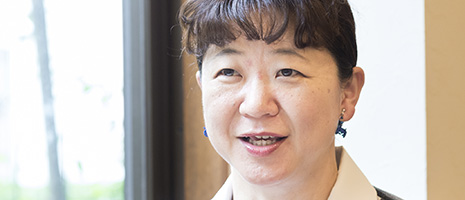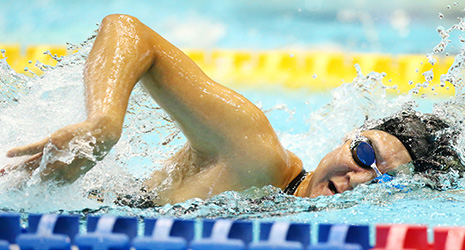Home > Highlighting JAPAN > Highlighting Japan August 2016 > The Summer Olympics: Gold Medal Wisdom from Japan
Highlighting JAPAN


The Amazing Power of Sports
Mayumi Narita, a fifteen-time gold medalist swimmer competing in her fifth Paralympic Games this summer, continues to embrace and promote “the amazing power of sports.”
Mayumi Narita, 45, fell in love with sports at a young age, though originally she was not a strong swimmer. After she became a wheelchair user as a result of illness in her junior high school years, she continued to enjoy various types of sports, including athletics, but had no desire to take up swimming. All that changed at the age of 23, when some fellow sports-loving friends asked her to join a relay team in a swimming competition.
“I was scared to enter the water initially. However, I also felt free when I was swimming,” says Narita. “Since then, my life has come to completely revolve around swimming.”
About a month after she started swimming, Narita took part in her first competition, and won. However, on the way back from the competition, she was involved in a traffic accident and was hospitalized for five months. On her release, she immediately returned to practice. She went on to compete in the 1996 Atlanta Paralympic Games, where she won 2 gold medals, 2 silvers and 1 bronze. Although she had to go back to the hospital for repeated operations, she nevertheless also competed in the 2000 Sydney Games, the 2004 Athens Games, and the 2008 Beijing Games. In total, she has won 15 gold, 3 silver and 2 bronze medals at the four Paralympic Games in which she has competed.
“Sports have helped me to grow. People often tell me that seeing me swim encourages them, and I gain strength when I see them cheer,” says Narita. “Sports have an amazing power that cannot be expressed in words.”
In addition to medals, Narita has also gained many friends from competing at the Paralympic Games. Kay Espenhayn, a German swimmer who passed away in 2002, became one of her greatest rivals and friends. Narita competed in the 50-meter backstroke and won a gold medal at the 2004 Athens Paralympic Games. However, she could not beat the world record set by Espenhayn. She visited Leipzig in 2005, Espenhayn’s hometown, and presented her gold medal to the Espenhayn family.
“I won the gold medal because of Kay,” says Narita. “I still remember her gentle voice and her powerful swimming style. She continues to live in my heart to this day.”
Narita retired from swimming after the Beijing Paralympic Games, and then became involved in welcoming activities as an executive board member of the Tokyo 2020 Olympic and Paralympic Games Bid Committee. After Tokyo was selected as the host city, she was appointed to the Tokyo Games’ Organising Committee. She has proposed ideas on how to make the 2020 Games a success, drawing upon her perspective as an athlete with a disability.
The work Narita has done with the Organising Committee has inspired her to compete again in the Paralympic Games. In 2015, she made her comeback as a swimmer, and in March this year she earned the chance to represent Japan and compete in the 2016 Rio Paralympic Games.
In May this year, Narita was also appointed as an ambassador of the World Forum on Sport and Culture. After the 2016 Summer Games, the attention of the world will shift to Japan, the host country of the next Olympic and Paralympic Games. Narita aims to not only tell people about the joy of sports, but also introduce the world to Japan by highlighting its food, traditional culture and natural splendor.
“When it comes to the beautiful nature we have here in Japan, places like the sea around Miyako-jima island in Okinawa, Ni-jima island in Tokyo and Fukue-jima, one of the Goto Islands in Nagasaki, are all truly breathtaking. However, they are not well known outside of Japan,” says Narita. “I want to promote domestic locations that are not often featured in the guidebooks.”
In addition to the Paralympic Games, Narita has been competing in the Japan Masters Swimming Championships for people with no disabilities since her 20s. She has gradually progressed through the rankings and says she aims to finish eighth when she’s in her 60s.
Building upon her own experience and work, Narita hopes to make sports more accessible.
“The potential of people is simply tremendous,” says Narita. “There is absolutely no need to be pessimistic about the future, even if you become a wheelchair user.”
© 2009 Cabinet Office, Government of Japan






